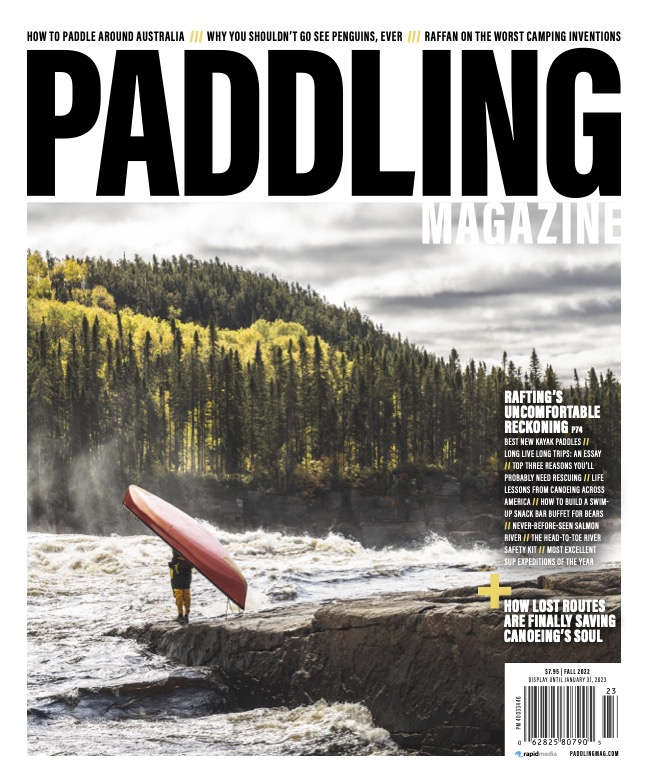Products You May Like
I spent a lot of time this summer floating in eddies. Mostly alone. These were the same eddies of my mid-20s where I spent time hiding from answering the big questions.
Most authors of self-help books don’t like to use the word crisis. In Daniel J. Levinson’s best-selling version of the story, The Seasons of a Man’s Life, he argues these are not times of crisis, but rather “specific periods of personal development through which all human beings must pass.”
It’s good to know you’re not alone. Crisis or not.
Although, simply knowing about the stages through which we all must pass doesn’t make the way through any easier.
Never turn back
I’d met Stephi Walker a few years ago. At the time she was living the dream. Mid-20s, a fresh whitewater instructor and experienced wilderness guide bouncing from contract to contract, from country to country. This summer, Stephi was back in the Ottawa Valley where she carved into one of my eddies. I was happy for the company and to get out of my head.
She was back in town for a visit and to sell her car, a Toyota Matrix she’d left here three years ago. She had only a few days left before she flew home to Scotland, where she’d spent most of the Pandemic working for an environmental agency. She had a couple more rivers to paddle and a canoe trip planned. She hadn’t yet sold her car.
“Sounds to me you have commitment issues,” I joked.
Selling the car meant cutting ties with her life here. Selling the Matrix meant moving further into the adult world, also known as settling down.
What does it mean to settle down?
Most people learn to paddle sometime in their 20s. You know, about the time we begin exploring all the possibilities of adult living. The world is full of adventure and wonderment. A time for keeping our options open and avoiding strong commitments.
Fun, right?
Except this is also when we are tasked with being more responsible, making sense of life and creating what Levinson calls a stable life structure.
Too much adventure and Levinson says life takes on an extremely transient, rootless quality.
Too much internal or societal pressure to settle down and “there is a danger of committing oneself too prematurely to a structure, without sufficient exploration of alternatives.”
By our early 30s, most of us are trying to work out the flaws and limitations of our chosen life paths. “Is this who I want to be?” we ask ourselves as we’re floating in eddies.
If we haven’t sorted it all out, annoying little voices scream in our heads, “If I am to change my life I must now make a start, for soon it will be too late.”
Just about the time you think you’ve figured it out, you get to do it all again—in midlife.
Pondering life at the Big Bend
Roddy MacIsaac is 67 years old. He owns the Big Bend Cafe where I drink coffee and write editorials. I usually order one of his all-day breakfasts, most of which are from his Grand Canyon guiding menu. Roddy tells me because of hip surgery, rehab and the Pandemic, he’s just returned from his first rafting trip in five long years. Roddy says he’s applied for another permit and invites me to join a spring run down the Main Channel of Idaho’s Salmon River.
When Roddy delivers me a BBQ pulled pork breakfast sandwich, he also drops on my table a copy of Never Turn Back, the life story of Walt Blackadar who, at age 49, made the first solo descent through Turnback Canyon on the Alsek River.
Forty-nine is about the age of the foreseeable second coming of the big question: What the hell am I going to do with my life? Call it a midlife crisis if you must.
As a physician, Blackadar was probably too busy to think about the life he really wanted. It’s no flashy sports car but first descents on remote rivers seems a legit way to rejuvenate himself and enrich his life.
We all feel at least some bits and pieces of a midlife transition, says Levinson. Our happiness depends on how much we let things like money, career, family and legacy chip away at us as we settle into full-fledged adulthood.
Roddy is older than me and seems less tyrannized by the ambitions and illusions of youth. He told me he’s cut back to four days a week at the restaurant. He seems content puttering around his property and playing in his gear shed. He says he wants to raft and ski deep into his 70s.
According to Levinson, a developmental crisis only occurs when we wake up to find our present life intolerable and we feel unable to form a better one. To form a better life, we first need to see a better life.
I know some people go to therapy. But floating the Main Channel of the Salmon in June looks pretty good to me.
Scott MacGregor is the founder and publisher of Paddling Magazine. Stephi didn’t sell her car and is currently on a ship sailing to Antarctica.
Feature photo: Scott MacGregor

 This article was first published in the Fall 2022 issue of Paddling Magazine.
This article was first published in the Fall 2022 issue of Paddling Magazine.